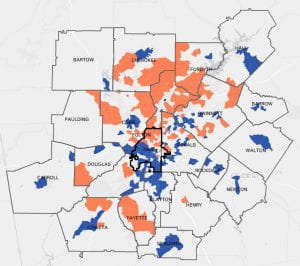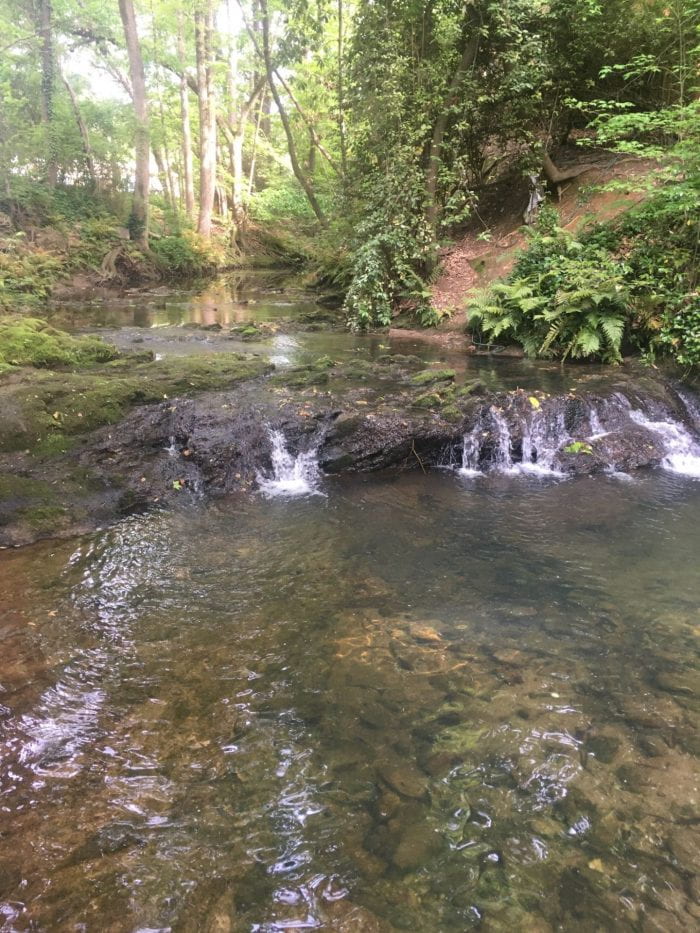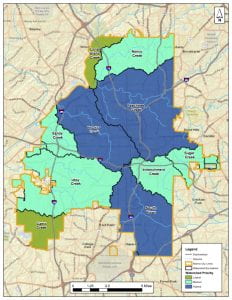Running a few yards from my last apartment building is a creek. It runs under Scott Blvd, and it is hidden by the green tree canopy. This creek’s name might be Peavine Creek, and it flows into Peachtree Creek. The reason I write “might be” is that the particular branch of the creek I lived near is not actually labeled on any map I could find. Only if I follow GoogleMaps further north, into Emory Village, is it named. However, these creeks are all connected. Peavine flows into Peachtree, and Peachtree flows into the Chattahoochee. A website fully based around “Proctor Creek” in Atlanta notes that the creeks of metro Atlanta “once shaped the city’s hilly terrain” (“Story of the Creek”).
The history of creeks and rivers in cities is interesting and fraught. When I chose to learn more about Peavine Creek, I was thinking about how in the early 20th century, many rivers and creeks were buried or forced through pipes, making space for more human development and creating sewage outlets. Many Atlanta residents walk over drive over streams and creeks daily, not even knowing it.
Major creeks around Atlanta have been used as receptacles for sewage. “Starting in the late 1800s, Atlanta launched a plan to use the city’s five main creeks… as trunk lines to carry wastewater away from the city and into rivers further downstream. Creeks and streams were encapsulated in pipes that carried both stormwater from rainstorms and sanitary sewage from households and businesses, discharging this wastewater into open creek beds further from the city center” (“Story of the Creek”). This is called a “combined sewage system.” Sometimes the sewage system overflows, resulting in a CSO. “These overflows or “events” result in the release of untreated human and industrial waste, toxic materials, and debris” (Calhoun). Though Atlanta has updated much of their wastewater management, there are still overflows, and there still exist the legacies of the combined sewer systems. This combined wastewater system, in addition to other pollution-creating human activities, results in serious consequences: including, but not limited to: providing optimal breeding grounds for mosquitoes, which may carry diseases like West Nile Virus, and bacteria like E. Coli, and making water unsafe to drink and unsafe for recreation, among many other serious ecological consequences for biodiversity and wildlife (Calhoun, Samuel).
Why is this a human rights consideration? For one, diseases and pollution have unequal impacts on people based on existing power structures and access to privilege. My focus then shifted from Peavine Creek, to Peachtree Creek, which Peavine Creek is a tributary to. And as I started doing more research about creeks in metro Atlanta, I came across a lot of information about Proctor Creek. I then started considering the semi-duality of Proctor Creek and Peachtree Creek. Proctor Creek runs through some of the poorest neighborhoods in Atlanta; on the other hand, Peachtree Creek runs through some of the wealthiest neighborhoods in metro Atlanta. I have included maps from the ARC and the City of Atlanta to illustrate this.

top 20% of neighborhoods with the highest median household incomes (orange)
the 20% with the lowest median household incomes (blue)
An article featured by WABE about Proctor Creek reads “‘At least to the early 20th century,’ said Will Bryan, an environmental historian at Georgia State. ‘Environmental racism went way back, and people were challenging it way back.’ For instance, in the 1900s, residents brought a lawsuit against a furnace company that was dumping trash into Proctor Creek, instead of burning it. The residents won — and these were African-American residents, during Jim Crow” (Samuel).
The article tells another story: in 2002 in Vine City, Proctor Creek flooded. “It was raw sewage, coming out of the sewers, untreated. People had climbed on top of tables and refrigerators to get out of it….Rain had overwhelmed the sewer system. The flood ended up being bad enough that the city decided to take over some of the affected land. People moved out, and about 60 houses were torn down.” Beyond risking human physical safety, this event also displaced humans from their homes, resulting in serious social and financial consequences for folks living in one of the most vulnerable communities in Atlanta.
When one looks up the history of Peachtree Creek, the majority of the Google results about the history of the creek revolve around the civil war battle that happened there. Unlike Proctor Creek, Peachtree Creek does not have articles written in WABE about grassroots efforts to clean it up or protect it, and it does not have articles written about the social impacts and civil rights violations around the creek’s pollution. This is not to say that there are not grassroots efforts around Peachtree Creek, and this is not to say that there are not environmental issues around Peachtree Creek; however, since Peachtree Creek and its watershed are located in such wealthy areas, it seems like there are a lot more governmental and nongovernmental efforts around cleaning and protecting the creek that involve large sums of money.
For example, in 2018 “The city of Atlanta [was] invited to apply for a $55 million WIFIA loan to go towards the $113 million estimated cost of the North Fork Peachtree Creek Tank and Pump Station project.” I could not find any articles explaining why the North Fork of Peachtree Creek was chosen over other creeks in Atlanta, such as Proctor Creek. However, I would again posit that the investment, and lack there of, has to do with the socioeconomic makeup of the residents around the creeks, demonstrating environmental racism and discrimination. Though, this is based only on a few hours of cursory research, not a full study. More research should be done into the socioeconomic divisions in the maintenance, upkeep, and water monitoring that creeks and streams receive around metro Atlanta.
This is only a glimpse into the histories of these creeks based primarily on news articles. As I wrote this, I further considered the statement that Dr. Calinda Lee quoted several times, “History is the stories that we tell ourselves about the past to explain the present.” Where does the past begin and the present begin? I began this piece looking at the history of wastewater management in the early 20th century in Atlanta, but the majority of the other pieces of information I included have come from the last decades.
Further, There are so many more creeks, streams, and histories around metro Atlanta. And there are so many more stories. At some point, I would be interested in doing more research, going more in depth into the histories of these veins of our city. Within the WABE article, the “Trouble with Atlanta’s Proctor Creek” Na’Taki Osborne Jelks, co-chair of the Proctor Creek Stewardship Council and board chair of the West Atlanta Watershed Alliance, is quoted saying, “This creek used to be such a source of pride for northwest Atlanta communities. People played in this creek, fished in this creek, learned how to swim in this creek.” The article continues, “People were baptized in the creek, too” (Samuel). Peoples’ stories around their relationships with these creeks- playing or fishing as children, getting Baptized, learning to swim, are also important pieces of the community’s and the creek’s history.
To create a history of Atlanta’s creeks and streams, one could look at the origins of their names and name changes. One could look at the streams from a naturalist perspective, considering how they formed and how they shaped the land and biodiversity around them. The streams could also be looked at from pre-colonial and post-colonial perspectives: looking at the history of the relationships the Creek and Cherokee had with these streams. One could consider how streams have been used for drinking water or wastewater or recreation as Atlanta has grown. All of these perspectives, plus more should be and need to be combined. As Dr. Calinda Lee said on About South, “There is no such thing as a partial truth. You tell the whole story as fully and completely and accurately as you can or maybe walk away from the whole thing.”
These perspectives should be considered all together, plus many, many more than I alone can not think of because of the limitations of my personal experience and understanding. Here, I have only started thinking about the relationships of Proctor and Peachtree Creeks with environmental and social violations, specifically around wastewater management. And I fear my writing style here is very essayistic and argumentative. There are so many more artifacts that need to be found and heard and seen to create a more full historical narrative.
Works Cited
Calhoun, Lisa M., et al. “Combined Sewage Overflows (CSO) Are Major Urban Breeding Sites for Culex quinquefasciatus in Atlanta, Georgia.” The American Journal of Tropical Medicine and Hygiene, vol. 11, no. 3, September 2007, pp.278-484, https://www.ajtmh.org/content/journals/10.4269/ajtmh.2007.77.478?crawler=true#html_fulltext.
Harris-Young, Dawn. “EPA Invites the City of Atlanta and DeKalb County to Apply for WIFIA Water Infrastructure Loans.” EPA’s Web Archive, EPA, 01 November 2018, https://archive.epa.gov/epa/newsreleases/epa-invites-city-atlanta-and-dekalb-county-apply-wifia-water-infrastructure-loans.html
Lee, Calinda (guest). “To Atlanta, With Love.” About South, Soundcloud, 2019, https://soundcloud.com/about-south/as-s04e10-to-atlanta-with-love
Samuel, Molly. “EPA Finds Toxic Chemicals In Fish In Atlanta’s Proctor Creek” WABE, 21 February 2017, https://www.wabe.org/epa-finds-toxic-chemicals-fish-atlantas-proctor-creek/
Samuel, Molly. “How Proctor Creek Health Problems Affect Those Living Nearby.” WABE, 22 May 2017, https://www.wabe.org/how-proctor-creek-health-problems-affect-those-living-nearby/.
Samuel, Molly. “The Trouble with Atlanta’s Proctor Creek.” WABE, 18 July 2017, https://www.wabe.org/the-trouble-with-atlantas-proctor-creek/.
“Story of the Creek.” About Proctor Creek, Proctor Creek Stewardship Council, https://aboutproctorcreek.wordpress.com/story-of-the-creek/.
Photo Credits
“Income Divide.” 33n, ARC Research, 19 December 2016, https://33n.atlantaregional.com/monday-mapday/monday-mapday-income-divide.
“Our Watersheds.” City of Atlanta Department of Watershed Management, https://www.atlantawatershed.org/watershedimprovementplans/

